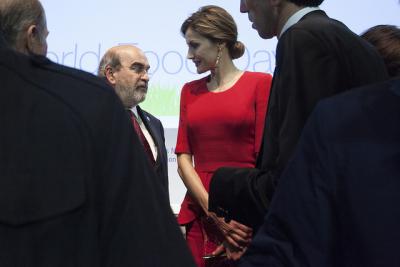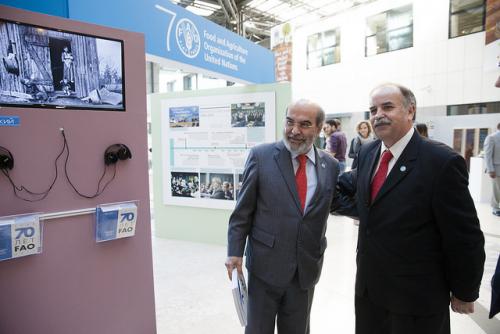FAO documents 'destroyed' in Spanish media clique fiasco

ROME – The quality of FAO documents and publications has plunged in recent months, becoming frequently unreadable gibberish as increasing numbers of poorly qualified Spanish staff are hired to the UN agency’s bloated Communications Division, diplomatic sources say.
“Under the previous Clinton Administration in the USA, it became a bit of a joke to say that one was not employable unless one was an FOB (Friend of Bill),” one diplomat said. “Now it would seem that in the FAO Communications Division, one is not employable unless one is an FOE (Friend of Enrique, for the newly-appointed Director of Communications Enrique Yeves).”
Under the Hispanic conquest underway at the Rome-based agency Senor Yeves just jumped from D-1 to D-2 position while Clara Velez Fraga, niece of one of Spain’s fomerly most powerful politicians and Chief of Outreach at FAO, just jumped to P-5.
Also benefitting from the trend are Pedro Javaloyes, Head of publications and the Library consultant on full Dsa at the P5 level and Patricia Pascau, consultant senior communications Specialist about to get P4 and yet another member of the senior Comms team Beatriz Beeckmans, communications Officer at p3 or P2, Irene Casado communications Officer, P2, Belen Delgado, Consultant Information Officer; Clara Axbladv Meyer a young Communications specialist, Ruben Bruque Senior Graphic designer, among others, the sources said.
FAO watchers are asking why these sometimes poorly-qualified new officers, some with even poorer English Language skills, are being hired, first as consultants, and then as Regular Programme staff members as the older and better-qualified staffers are pushed out into the field under the guise of the agency’s Mobility Programme.
One FAO insider said: “The Spanish recruitment effort is having operational consequences, ultimately resulting in the lack of quality public goods products produced by the Organization. Documents/publications are first produced in poor Spanish by poorly-qualified FOE individuals, then necessarily sent out for translation into English.”
“Because of the poor quality of the English translation emanating from the poor original Spanish texts, the documents/publications have had to be destroyed in many cases, only to be redrafted in their entirety.”
Against this background, Permanent Representatives paying the Assessed Contributions to FAO's coffers, are expected to ask FAO management whether this is the best use of their financial resources, or whether they are just financing Spain in its efforts to get its citizens on board the FAO payroll. The Permanent Representatives’ mandate is to finance the work of the Organization without according special preference for the nationals of any one particular country.
Member Nation capitals have discerned the deterioration in FAO document/publications quality of late.
Spanish is Brazilian FAO Director General José Graziano da Silva’s principal Language of communication ( Portuguese is not an official UN Language) .
An alliance was forged between Spain and Brazil at FAO in 2010 when Brazil first decided to present a candidate for DG, with the understanding that Spain would support Brazil.
In subsequent musical chairs in the Spanish Government, then Spanish prime minister Zapatero kicked out Spanish Foreign Minister Moratinos from his Cabinet. Moratinos went on a special visit to UN Headquarters, and on his own initiative received endorsement from Ban-Ki-Moon for his bid to become FAO DG. He forced Spain to endorse his candidacy, to the chagrin of the Brazilians who were counting on Spanish support, because he had garnered the Secretary General's support on his own.
The Brazilians then got the EU Commissioner to present another EU candidate, Fischler, so that they could split the Europeans.
“The Spanish people at FAO were playing it both ways,” said one seasoned observer, “on the one hand they were supporting Moratinos, while still trying to undermine him, and on the other hand they were supporting Graziano.” Graziano won by only four votes after more horsetrading took place.
Support for his election still is being rewarded in top appointments, for example for Peru that was given special dispensation from contribution arrears to vote for Graziano.
“This is why Servan (a Peruvian) is Deputy Head of Human Resources, although he has no HR experience whatsoever, and it is why Mario Arvelo was ‘appointed’ by the Conference to chair the Appeals Committee (he was instructed by Graziano to kill all appeals by staff members internally through this Committee),” one insider said.
“There is persistent speculation that Graziano will remove Louis Gagnon (Director of the Conference, Council and Protocol Affairs Division) and replace him with Mario Arvelo.”
Staff association sources note that Graziano is once again targetting older staff officers of FAO for redeployment to the field. The bulk of those staff members being targetted are over the age of 55, and in many cases over 58, primarily from OECD Anglo countries. FAO evidently is making a concerted effort to push these officers out of headquarters to make room for the Spanish and Latin American lobbies, even though they are close to retirement and some have serious health problems inhibiting their ability to perform effectively in the field.



